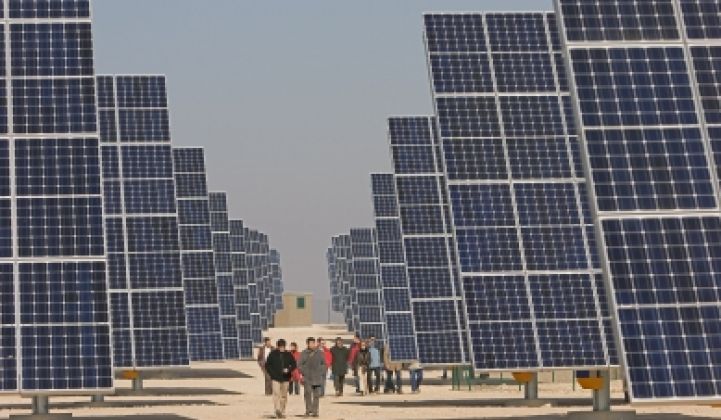The European Commission's new proposal to boost solar technology development focuses too much on research and not enough on deploying commercial technologies, said the European Photovoltaic Industry Association (EPIA) Wednesday.
The EPIA also voiced concerns that the proposal would not receive sufficient funding and is lobbying for more public money to be set aside to support the solar industry's growth.
The European Commission on Wednesday unveiled a new plan for achieving its greenhouse gas reduction goals and called for an additional €50 billion investment in research and development of renewable energy technologies over a 10-year period, including solar, wind, nuclear, carbon capture and storage.
For solar, the plan calls for supporting both new technologies that make use of solar panels (photovoltaics) as well as solar thermal equipment. Solar energy could make up 15 percent of the electricity supply within the European Union if €16 billion of the €50 billion goes to solar research (see the commission's technology plan).
For the photovoltaics development, the proposal calls for establishing a long-term research program, up to five pilot production plants for new technologies, and projects for centralized and distributed solar generation.
For the solar thermal power development, the proposal wants to finance up to 10 demonstration power plants, as well as to support research into storing power for use at night, cutting costs and boosting energy production.
The commission also proposed to add energy efficiency technologies to its technology plan. This new focus would start with a project called Smart Cities Initiative, which would involve up to 30 cities.
"Energy efficiency is the simplest and cheapest alternative to reduce CO2 and improve energy security. In transport, buildings and industry, available technology opportunities must be turned into business opportunities," the commission said on a FAQ page.
To boost funding to €50 billion would mean increasing the annual investment from €3 billion to €8 billion from 2010 to 2020, the commission said. The European Union has set a goal of reducing its emissions by 20 percent below the 1990 levels by 2020.
While the commission didn't spell out exactly where the new funding would come from, it expects the private sector to make the biggest contribution, followed by each member country's budget and European Union's own budget, reported Dow Jones Newswire.
But the EPIA, which represents companies that make solar panels and related components, said the commission should direct more support at deploying technologies that already are commercially available and making Europe the largest solar market in the world.
"The EC is putting too much emphasis on long-term research and should better recognise the need for accelerating the development of existing commercial and pre-commercial PV technologies," according to an EPIA statement. "Of course, long-term research should be carried out in parallel through other instruments."
The commission still needs to work with its member countries to decide on ways to fund the new plan. The EPIA said "large public funding" should be set aside for the plan, particularly given the economic downturn.
The EPIA also wants the commission to include solar in its Smart Cities initiative.
Photo of a solar garden in Spain courtesy of Acciona



